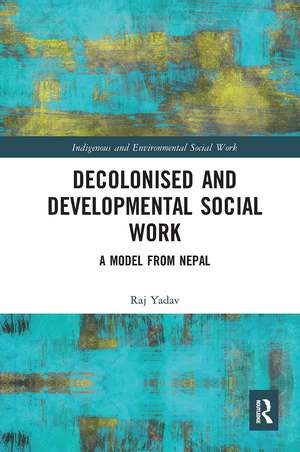Decolonised and Developmental Social Work: A Model from Nepal: Indigenous and Environmental Social Work
Autor Raj Yadaven Limba Engleză Paperback – 18 dec 2020
By using interviews with Nepali social workers, this text goes beyond mere theoretical approaches and uniquely positions itself in a way that embraces rigorous bottom-up, grounded theory method. It will also further ongoing debates on globalisation-localisation, universalisation-contextualisation, outsider-insider perspectives, neoliberal-rights and justice oriented social work, and above all, colonisation-decolonisation of social work knowledge and practice. It also promotes solidarity of, and the struggle for, progress for those in the margins of Western social work and development narrative through an emerging theory-praxis of decolonised and developmental social work.
Decolonised and Developmental Social Work is essential reading for students, academics, and researchers of social work and development studies, as well as those striving for a decolonial worldview.
| Toate formatele și edițiile | Preț | Express |
|---|---|---|
| Paperback (1) | 382.85 lei 6-8 săpt. | |
| Taylor & Francis – 18 dec 2020 | 382.85 lei 6-8 săpt. | |
| Hardback (1) | 999.46 lei 6-8 săpt. | |
| Taylor & Francis – 21 mar 2019 | 999.46 lei 6-8 săpt. |
Preț: 382.85 lei
Nou
Puncte Express: 574
Preț estimativ în valută:
73.26€ • 76.64$ • 60.86£
73.26€ • 76.64$ • 60.86£
Carte tipărită la comandă
Livrare economică 03-17 aprilie
Preluare comenzi: 021 569.72.76
Specificații
ISBN-13: 9780367671471
ISBN-10: 0367671476
Pagini: 202
Dimensiuni: 156 x 234 x 23 mm
Greutate: 0.61 kg
Ediția:1
Editura: Taylor & Francis
Colecția Routledge
Seria Indigenous and Environmental Social Work
Locul publicării:Oxford, United Kingdom
ISBN-10: 0367671476
Pagini: 202
Dimensiuni: 156 x 234 x 23 mm
Greutate: 0.61 kg
Ediția:1
Editura: Taylor & Francis
Colecția Routledge
Seria Indigenous and Environmental Social Work
Locul publicării:Oxford, United Kingdom
Cuprins
List of figures; List of tables; List of abbreviations; Acknowledgements; Notes on transliteration and Nepali terminology; Meaning of Nepali terms and cultural practices; Foreword; Preface; Prologue: an honest, heretofore untold story of Nepali social work; Chapter 1: Thinking about decolonised and developmental social work; Why decolonised, developmental social work?; Decolonised and developmental social work: pedagogy, politics, and praxis; Background to, and rationale for, the decolonised, developmental social work in Nepal; Genesis, central arguments, and inquiry method of the book; Author’s positionality and reflexivity in knowledge production; Synergies with indigenous ways of knowing; Synergies with a critical theory and thinking; Definition of key terms used in the book; Way forward; Chapter 2: The puzzle of Nepali narratives: historical dynamics and contemporary issues; Geography, ecology, and regional dynamics; Critical junctures in the making of the Nepali state; Revisiting Nepali history: One step forward, two steps back; Sociocultural groups of Nepal: cleavage, conflict, and new politics; Quest for inclusion, rights, and justice: revisiting the people’s movements and Maoist insurgency; Lifestyles, values, and identities: cultural narratives; Context of social services: state and non-state actors; Conclusion; Chapter 3: International non-government organisation and Nepali development: a place for Nepali social workers to engage; Metaphysics of, and definitional challenges to, INGOs; INGOs in Nepal; Development planning and INGOs’ engagement in Nepal; INGO culpability for failed development; Costs of development; Conclusion; Chapter 4: Social work education in Nepal: a brief historical perspective; Historical development of higher education in Nepal; Development of social work education in Nepal; Contemporary scenario of social work education in Nepal; Influence of international organisations on social work education; Major issues in social work education; Conclusion; Chapter 5: From an imported model to a decolonisation of social work; Revisiting imported social work in Nepal; Modernising social work; Technology transfer: from the West to the rest; Indigenous social work: concept and construct; A paradigm shift from indigenisation to decolonisation; Conclusion; Chapter 6: Influence and context for decolonised and developmental Nepali social work; Social workers’ motivations; Concerns about Nepali social work education; Concerns about professional elitism; What the ‘social’ in Nepali ‘social work’ entails: the case for decolonisation; Social issues for Nepali social work: the case for development; Advocating for the voiceless: the case for political focus; Conclusion; Chapter 7: Decolonised and developmental Nepali social work: a model ground up; Social workers’ concerns; Social components of decolonised practice; Developmental components of decolonising practice; Political components of decolonising practice; Model of decolonised and developmental Nepali social work practice; Implications in social work: synergies with extant literature; Conclusion; Chapter 8: Moving forward; Yet, a temporal end; The best of decolonisation; References; Index
Notă biografică
Raj Yadav, PhD, is from Nepal, and now makes his temporary home in Australia. His interest lies in decolonising epistemologies and their use in advancing knowledge production in the fields of social work and development. He has worked as a lecturer and has contributed to social work curriculum development in universities in Nepal and Australia.
Descriere
Using new empirical data and an extensive detail of social, cultural and political dimensions of Nepal, this book proposes a new model of ‘decolonised, developmental social work’ that can be applicable in a wide range of countries and cultures.




